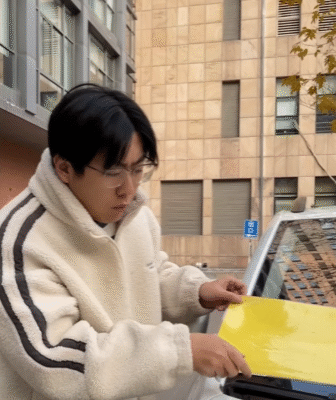
Whether you’re going on vacation, traveling for work, or simply putting your car aside for a season, parking your vehicle for an extended period requires some preparation. Many people make the mistake of leaving their car without taking any preventive steps, only to return weeks or months later to a dead battery, flat tires, or even engine trouble. Proper preparation ensures that your car stays in good condition, saving you time and expensive repair costs later. In this article, we’ll explore the five essential things you must do before parking your car for a long time.
1. Clean Your Car – Inside and Out
One of the first and most important things to do before long-term parking is to thoroughly clean your car. This might seem unnecessary at first—after all, you’re not using it—but there are good reasons for it.
On the outside, dirt, dust, bird droppings, tree sap, and road salt can cause paint damage if left sitting on the surface for weeks or months. Washing and waxing your car helps protect the paint and prevent corrosion.
On the inside, crumbs, spilled drinks, or any organic material can attract insects or rodents. These pests may damage wiring, seats, or carpeting. Vacuuming the interior, wiping down surfaces, and removing all trash can help keep pests away and preserve your car’s condition.
Pro Tip: Use a car cover if you’re parking outdoors. It provides added protection against weather and UV rays.

2. Fill the Gas Tank and Add Fuel Stabilizer
Before you store your car, it’s a smart idea to fill the gas tank completely. A full tank prevents moisture from accumulating inside the tank and mixing with the fuel, which can lead to rust and fuel system issues.
In addition, you should add a fuel stabilizer to the tank. Fuel can degrade over time—usually within 30 to 60 days—especially if the car is not being driven. A stabilizer helps maintain fuel quality for up to six months or more, ensuring the engine starts smoothly when you return.
Once you’ve added the stabilizer, drive the car for a few minutes to allow the treated fuel to circulate throughout the fuel system.
3. Disconnect the Battery or Use a Battery Maintainer
One of the most common issues with a car that’s been sitting unused is a dead battery. Even when a car is turned off, it still uses a small amount of electricity to maintain clocks, computer settings, and alarm systems. Over time, this slow drain can completely deplete the battery.
There are two ways to prevent this:
- Disconnect the negative battery terminal. This will stop the battery from discharging, though you may lose some settings like your radio presets.
- Use a battery maintainer (or trickle charger). This device connects to your battery and keeps it charged at the right level without overcharging it. It’s especially useful if you’re storing the vehicle in a garage with an available power outlet.
Caution: If you’re not familiar with handling car batteries, it’s best to consult a mechanic or follow your vehicle’s manual closely.
4. Inflate the Tires to the Recommended Pressure
Tires naturally lose pressure over time, and a car that sits for weeks or months without moving can develop flat spots. These are areas of the tire that become permanently flattened due to prolonged contact with the ground. Not only can this cause a bumpy ride, but in severe cases, it can also damage the tire.
To avoid this, check the tire pressure and inflate all four tires to the manufacturer’s recommended PSI. You can find this information on a sticker inside the driver’s door or in your car’s manual.
If you plan to leave the car for more than a few months, consider putting it on jack stands to remove pressure from the tires entirely. This is especially recommended for classic cars or seasonal vehicles like sports cars and RVs.

5. Protect Against Pests and Moisture
A stationary car can be an inviting shelter for rodents, insects, and moisture. Rodents, in particular, can chew through wiring, insulation, and hoses—causing costly damage.
Here’s how you can protect your vehicle:
- Seal all entry points. Use steel wool or rodent repellent foam in areas where animals might get in (such as the exhaust pipe or air intakes). You can also buy special rodent-repellent tape or place mothballs around the vehicle (though be careful with strong smells in enclosed spaces).
- Close all windows and sunroofs. This helps keep moisture, bugs, and animals out. If possible, use a dehumidifier bag inside the car to prevent mold and mildew.
- Avoid parking near trash bins or grassy areas. These environments attract rodents more easily.
If you’re storing your car in a garage, make sure the area is dry and well-ventilated. Use moisture absorbers or silica gel packs to keep the interior dry and odor-free.

Bonus Tips:
- Do not engage the parking brake. While it might seem logical to use it, keeping the parking brake engaged for a long time can cause the brake pads to stick to the rotors. Instead, use wheel chocks to prevent the car from rolling if you’re on an incline.
- Update your insurance. If your car is off the road, ask your insurance provider if you can adjust your coverage. Some companies offer a “storage insurance” policy that’s cheaper while still protecting your car.
- Document everything. Take photos of your car’s condition before you leave it. This is helpful for insurance purposes and for comparing wear and tear once you start driving again.
Final Thoughts
Parking your car for an extended period doesn’t have to be a stressful experience. With just a few simple steps, you can protect your vehicle and ensure that it’s ready to go when you return. To recap, the five most important things you must do are:
- Clean your car thoroughly.
- Fill the gas tank and add a fuel stabilizer.
- Disconnect the battery or use a battery maintainer.
- Inflate your tires properly.
- Protect your car from pests and moisture.
Taking these precautions can save you hundreds or even thousands of dollars in repairs and give you peace of mind while your car is at rest. Treat your vehicle with care before parking it long-term, and it will reward you with reliable service when you need it again.



